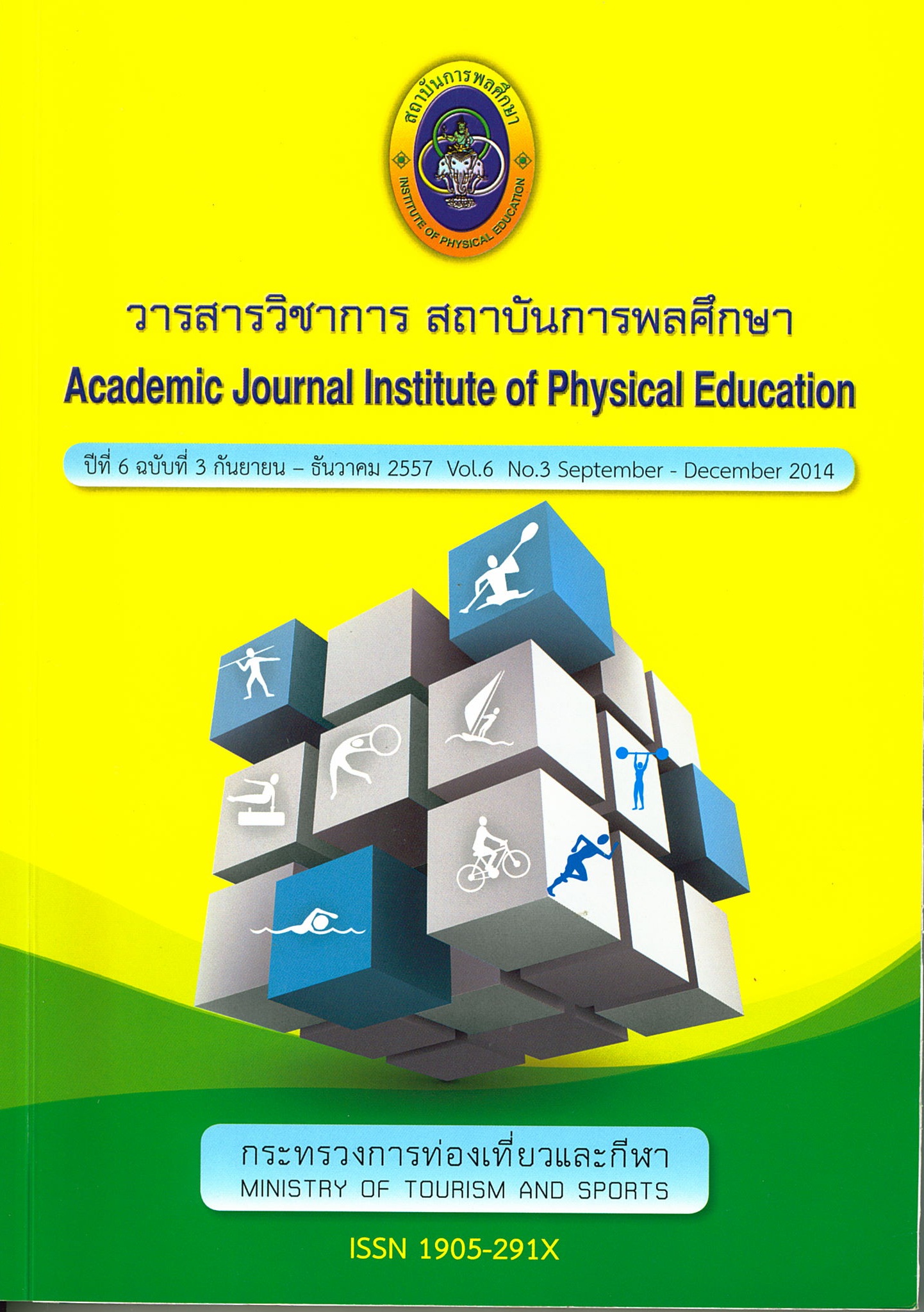การศึกษาแบบการเรียนรู้ของนักศึกษาสถาบันการพลศึกษา
Main Article Content
บทคัดย่อ
การวิจัยครั้งนี้ มีวัตถุประสงค์เพื่อศึกษาแบบการเรียนรู้ของนักศึกษาสถาบันการพลศึกษา และเพื่อ เปรียบเทียบแบบการเรียนรู้ของนักศึกษาสถาบันการพลศึกษา จําแนกตามตัวแปร เพศ คณะวิชา และ ผลสัมฤทธิ์ทางการเรียน กลุ่มตัวอย่างที่ใช้ในการวิจัย ได้แก่ นักศึกษาสถาบันการพลศึกษา วิทยาเขต เพชรบูรณ์ สถาบันการพลศึกษา วิทยาเขตศรีสะเกษ สถาบันการพลศึกษา วิทยาเขตชุมพร และสถาบัน การพลศึกษา วิทยาเขตสมุทรสาคร ที่กําลังศึกษาในปีการศึกษา 2555 จํานวน 377 คน เครื่องมือที่ใช้ ในการเก็บรวบรวมข้อมูลเป็นแบบสอบถามมาตราส่วนประมาณค่า (Rating Scale) ซึ่งพัฒนามาจาก แบบสอบถามรูปแบบการเรียนรู้ของ กราชา และไรซ์แมน (Grasha and Reichmann) จํานวน 6 แบบ ได้แก่ แบบอิสระ แบบหลีกเลี่ยง แบบมีส่วนร่วม แบบพึ่งพา แบบแข่งขัน และแบบร่วมมือ การวิเคราะห์ ข้อมูลใช้การหาค่าร้อยละ ค่าเฉลี่ย ส่วนเบี่ยงเบนมาตรฐาน และหาค่าที (t-test)
ผลการวิจัย พบว่า
- นักศึกษาสถาบันการพลศึกษามีแบบการเรียนรู้ทุกแบบอยู่ในระดับมาก โดยมีค่าเฉลี่ยเรียง ตามลําดับ คือ แบบมีส่วนร่วมเป็นอันดับแรก รองลงมาแบบพึ่งพา แบบแข่งขัน แบบอิสระ แบบหลีกเลี่ยง และแบบร่วมมือ ตามลําดับ
- นักศึกษาชายและนักศึกษาหญิงมีแบบการเรียนรู้ไม่แตกต่างกัน
- นักศึกษาคณะศึกษาศาสตร์ นักศึกษาคณะวิทยาศาสตร์การกีฬาและสุขภาพ และนักศึกษาคณะ ศิลปศาสตร์ มีแบบการเรียนรู้ไม่แตกกัน
- นักศึกษาที่มีผลสัมฤทธิ์ทางการเรียนสูง ผลสัมฤทธิ์ทางการเรียนปานกลางและผลสัมฤทธิ์ทาง การเรียนต่ํามีแบบการเรียนรู้ไม่แตกต่างกัน
Article Details

อนุญาตภายใต้เงื่อนไข Creative Commons Attribution-NonCommercial-NoDerivatives 4.0 International License.
บทความที่ได้รับการตีพิมพ์เป็นลิขสิทธิ์ของวารสารวิชาการ มหาวิทยาลัยการกีฬาแห่งชาติ ข้อความที่ปรากฏในบทความแต่ละเรื่องในวารสารวิชาการเล่มนี้ เป็นความคิดเห็นส่วนตัวของผู้เขียนแต่ละท่านไม่เกี่ยวข้องกับวารสารวิชาการมหาวิทยาลัยการกีฬาแห่งชาติ แต่อย่างใด ความรับผิดชอบองค์ประกอบทั้งหมดของบทความแต่ละเรื่องเป็นของผู้เขียนแต่ละท่าน หากมีความผิดพลาดใดๆ ผู้เขียนแต่ละท่านจะรับผิดชอบบทความของตนเองแต่ผู้เดียว
เอกสารอ้างอิง
กรองกาญจน์ อรุณรัตน์และโสภณ อรุณรัตน์. (2547). รูปแบบการเรียนของนักศึกษาคณะศึกษาศาสตร์มหาวิทยาลัยเชียงใหม่, เชียงใหม่ : มหาวิทยาลัยเชียงใหม่,
จันทนา พรหมศิริ. (2535), แบบการเรียนรู้ของนิสิตมหาวิทยาลัยเกษตรศาสตร์, วิทยานิพนธ์ คุรุศาสตร์มหาบัณฑิต จุฬาลงกรณ์มหาวิทยาลัย.
พลศึกษา, สถาบัน. (2548). หลักสูตรสถาบันการพลศึกษา. กรุงเทพฯ: องค์การรับส่งสินค้าและพัสดุภัณฑ์.
ทิศนา แขมมณี และคณะ. (2548), ศาสตร์การสอน, กรุงเทพฯ: จุฬาลงกรณ์มหาวิทยาลัย.
ทบวงมหาวิทยาลัย. (2544 ข), นโยบายแนวทางและวิธีการประกันคุณภาพการศึกษาระดับอุดมศึกษาส่วนวิจัยและพัฒนาสํานักมาตรฐานอุดมศึกษา. กรุงเทพฯ: ทบวงมหาวิทยาลัย,
รัตนาภรณ์ มีรักษา. (2549มีนาคม) โมเดลความสัมพันธ์เชิงสาเหตุของแบบการเรียนของนักเรียนชั้นมัธยมศึกษาปีที่ 6. วารสารวิจัยและวัดผลการศึกษา ปีที่ 4 ฉบับที่ 1 มีนาคม 2549.
วัลลภา เทพหัสดิน ณ อยุธยา. (2544 ข), การพัฒนาการเรียนการสอนทางการอุดมศึกษา. กรุงเทพฯ: ภาควิชาอุดมศึกษา คณะครุศาสตร์ จุฬาลงกรณ์มหาวิทยาลัย.
สมหวัง พิธิยานุวัฒน์. (2544), บทสรุปของผู้บริหารโครงการศึกษาวิจัยเรื่องการปฏิรูปการเรียนการสอนระดับอุดมศึกษา. กรุงเทพฯ : โรงพิมพ์ลาดพร้าว,
สํานักงานคณะกรรมการการศึกษาแห่งชาติ. (2547). พระราชบัญญัติการศึกษาแห่งชาติ (ฉบับที่ 1-2) พ.ศ. 2542-2545 ปรับปรุง 2547-2549. กรุงเทพมหานคร: สูตรไพศาล.
สุรศักดิ์ ยอดหาญ. (2546). รูปแบบการเรียนรู้ของนักศึกษาระดับบัณฑิตศึกษา สถาบันราชภัฏในเขตกรุงเทพมหานคร. วิทยานิพนธ์ครุศาสตร์อุตสาหกรรมมหาบัณฑิต สาขาวิชาบริหารอาชีวศึกษาสถาบันเทคโนโลยีพระจอมเกล้าเจ้าคุณทหารลาดกระบัง.
สุวพิชชา ประสิทธิธัญกิจ. (2553). แบบการเรียนรู้ของนักศึกษาระดับบัณฑิตศึกษา คณะศึกษาศาสตร์ มหาวิทยาลัยรามคําแหง, กรุงเทพฯ: มหาวิทยาลัยรามคําแหง.
อัจฉรา สังข์สุวรรณ. (2550, กรกฎาคม-ธันวาคม) แบบการเรียนของนักศึกษาวิทยาลัยเทคโนโลยีอุตสาหกรรม, วารสารวิชาการเทคโนโลยีอุตสาหกรรม ปีที่ 3 ฉบับที่ 2 กรกฎาคม-ธันวาคม.
Dunn, R., & Dunn, K. (1993). Teaching secondary student through their individual grades learning Style : Practical approaches for grade 7-12. Massachusettss: A Division of Simon & Schuster, Inc.
Grasha, A., & Reichmann, S. (1975). Workshop handout on learning styles. Ohio: Faculty Research Center, University of Cincinnati.
Keefe, J.W. (1984, February). Learning style. National Association of Secondary School Principals. 68, 59-63.D.A. (1997).
Kolb, D.A. (1981). Learning Styles inventory : Self-scoring test and interpretation booklet. Boston: McBer and company.
Krejeie, Robert V. and Earyle W. Morgan. (1970). Determining Sample Size for Research Activities : education and phychological Measurement. 30 : 608, Autumn.
Wolfe, D.M., & Kolb, D.A. (1984). Career development personal growth and experiential learning. In Reading Organizational psychology. Englewood Cliffs, New Jersey: Prentice-Hall.


